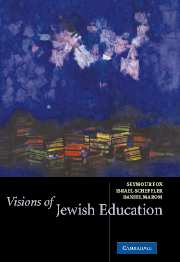Book contents
- Frontmatter
- Contents
- Preface and Acknowledgments
- About the Mandel Foundation
- Introduction
- Part I The Visions Project
- Part II Visions in Detail
- Introduction
- 4 What Must a Jew Study – and Why?
- Supplement: Isadore Twersky
- 5 Jewish Studies in Israel from a Liberal-Secular Perspective
- Supplement: Menachem Brinker
- 6 We Were as Those Who Dream: An Agenda for an Ideal Jewish Education
- Supplement: Moshe Greenberg
- 7 Reflections on the Educated Jew from the Perspective of Reform Judaism
- Supplement: Michael A. Meyer
- 8 Educated Jews: Common Elements
- Supplement: Michael Rosenak
- 9 The Concept of the Educated Person: With Some Applications to Jewish Education
- Supplement: Israel Scheffler
- Part III Visions in Context
- Conclusion: The Courage to Envision
- The Visions Project: Participants and Forums
- Index
Supplement: Israel Scheffler
Published online by Cambridge University Press: 08 January 2010
- Frontmatter
- Contents
- Preface and Acknowledgments
- About the Mandel Foundation
- Introduction
- Part I The Visions Project
- Part II Visions in Detail
- Introduction
- 4 What Must a Jew Study – and Why?
- Supplement: Isadore Twersky
- 5 Jewish Studies in Israel from a Liberal-Secular Perspective
- Supplement: Menachem Brinker
- 6 We Were as Those Who Dream: An Agenda for an Ideal Jewish Education
- Supplement: Moshe Greenberg
- 7 Reflections on the Educated Jew from the Perspective of Reform Judaism
- Supplement: Michael A. Meyer
- 8 Educated Jews: Common Elements
- Supplement: Michael Rosenak
- 9 The Concept of the Educated Person: With Some Applications to Jewish Education
- Supplement: Israel Scheffler
- Part III Visions in Context
- Conclusion: The Courage to Envision
- The Visions Project: Participants and Forums
- Index
Summary
Part One: Autobiographical Reflections
In his memoir Teachers of My Youth: An American Jewish Experience, Israel Scheffler describes his early experience of Jewish education, from traditional ḥeder [lit., room; setting of traditional Torah education for Eastern European youngsters] and yeshivah settings to rabbinical training at the Jewish Theological Seminary, and his complementary experiences in settings of general education, ranging from public school to Brooklyn College. One of his motivations in writing these reminiscences is to understand how he was able to maintain a positive and interactive relation with both religious and secular life.
“Jewish secular intellectuals have often been uneven in their secularism,” he explains. “Appreciative of other religions they did not accept, they have been obtuse about the religion of their parents. Understanding the cultures and nationalisms of others, they have frequently been particularly unsympathetic to the Jewish variants. Universalism and secularism have, in their hands, been applied unfairly.” Scheffler feels a “special responsibility” to explore his continuing commitment to Judaism despite a career in philosophy, “the most universal of universal subjects, the most vigorous claimant to rationality in judgment and belief.”
Scheffler attributes his avoidance of this double standard to a rigorous and positive experience of Jewish education: “Because I am one of the very small number of my generation who did in fact receive a strong Jewish religious education, I have felt a special responsibility to reflect, and reflect on, this aspect of my life which, received from my parents and teachers, has formed my character and existence in quite fundamental ways.
- Type
- Chapter
- Information
- Visions of Jewish Education , pp. 233 - 250Publisher: Cambridge University PressPrint publication year: 2003
- 1
- Cited by

